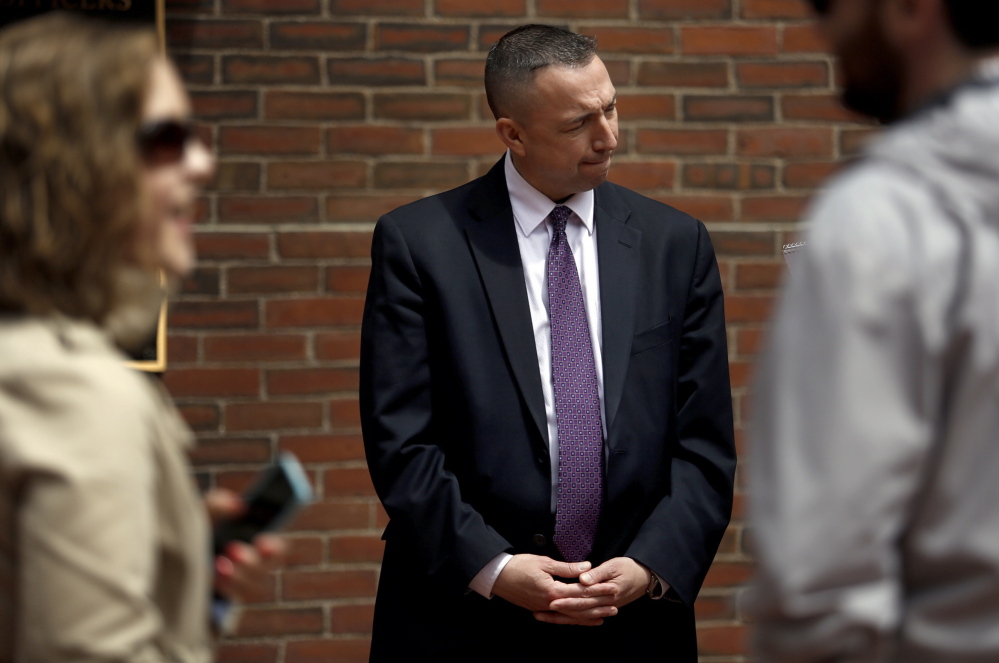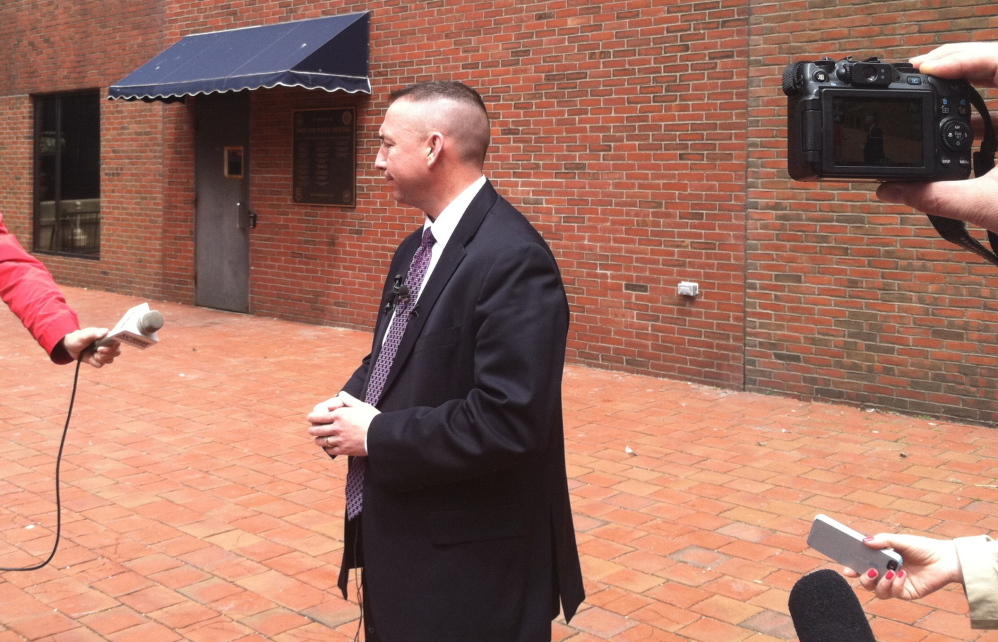A national newspaper’s report that Maine’s largest city is home to three violent rival gangs is wildly exaggerated, law enforcement officials said Tuesday.
Gangs that do exist in Portland, and to an extent in other parts of Maine, tend to be small, neighborhood groups involved in drug activity, they said, not the large, national organizations that battle for turf in some of the largest cities.
“When community members read a story about gangs, they’re going to think about that classic Bloods and Crips and ‘I’m going to wear this color and you’re going to wear that color and we’re going to hate each other for life,’ and we don’t have that problem here in the city of Portland,” said Police Chief Michael Sauschuck. “I do not believe we have an ongoing issue with violent criminal gangs in the city of Portland.”
Sauschuck spoke at a news conference in response to the Los Angeles Times story Tuesday that said Portland is “home to a trio of violent gangs called the True Somali Bloods, the Little Rascals Gang and a newly formed faction of the Crips Nation.”
Aaron Steps, resident agent in charge of the FBI in Maine, noted that Maine has one of the nation’s lowest murder rates – an indication that gang activity is far different from other parts of the country.
“We recognize specific national gangs – Latin Kings, MS-13, the Bloods, Crips – those types of organizations that have been around for a while,” Steps said. “A national gang is persistent, national and it’s well organized.
“A neighborhood gang might be six guys who grew up together, friends who trust each other, maybe violent,” he said. “When they go away either because they go to jail, pass away or are trying to clean up their lives, that organization goes away.”
The Los Angeles Times story was written by Richard Serrano, who is based in Washington, D.C. He said Tuesday that he based much of the story on federal documents he had obtained, but he would not describe the nature of the documents or their origin, other than to say they are not publicly available.
His description of Portland’s gang activity was based on interviews with federal officials, he said.
The story says federal and state law enforcement have investigated the rival gangs for years as part of operation “Run This Town.”
The FBI’s Steps said he could not comment on the existence of any investigation that has not culminated in charges. Sauschuck refused to comment on “Run this Town,” saying he would discuss only Portland cases.
GANG MEMBER NUMBERS DISPUTED
Quantifying gang presence in Maine has proven difficult.
A 2011 National Gang Threat Assessment by the FBI estimated the number of gang members in Maine at 4,000, most clustered around Greater Portland. That appeared to be a big increase from 2009, when only about 1,000 gang members were linked to Maine.
But the 2011 report has been challenged by state and local officials, including Sauschuck, who say they have not tracked gang activity and aren’t sure where the FBI got the 4,000 figure.
Nationally, there are about 33,000 street, motorcycle and prison gangs with about 1.4 million members, according to the FBI. They often use violence to control neighborhoods and support their business endeavors, including gun and drug trafficking.
The FBI assessment listed 20 gangs with a presence in Maine. The assessment estimated that Maine had four to six gang members per 1,000 people, more than the other New England states, and four to six gang members per police officer, a higher concentration than all New England states but Vermont.
Cmdr. Scott Pelletier, head of the Maine Drug Enforcement Agency in the southern part of the state, said his agents rarely encounter gang members.
“In the drug world, we always have out-of-state people who come to set up shop for drugs, but they’re not gang-affiliated that we can determine,” Pelletier said.
He said that while they’re in the area selling drugs, they often try to convince addicts or others to buy guns for them that they can bring back south.
NO SIGN OF VIOLENT SOMALI GANG
The Portland-based Southern Maine Gang Task Force, which includes federal and local officers, came together in 2011. Its goal is to identify when gangs coalesce or whether members come here from out of state to sell drugs, and to keep those gangs from becoming entrenched.
Sauschuck said he is familiar with the groups mentioned in the Los Angeles Times story, though he would not characterize the level of violence or illegal activity associated with any particular one. He also would not refer to them by name, suggesting that the recognition elevates their profile and is one of their goals.
“These loosely affiliated criminal organizations have been violent in the past,” Sauschuck said. “I don’t believe they have embedded in our community because we have been proactive. I take umbrage with the characterization that Portland is the home of the … gangs that are listed. That is not the case in any way.”
The True Somali Bloods, a self-identified group, included members of the Somali immigrant population, which numbers about 6,000 in Maine, mostly in Portland and Lewiston.
Somali leaders who were interviewed Tuesday disputed the notion that there are Somali gangs in Portland.
Ahmed Hassan, a citizen activist in Portland’s Somali community, said there may be a few Somalis who deal drugs, but there is no connected network of people who form a Somali gang.
“There may be a few people who associate with each other, maybe a drug house, but there are no gangs,” Hassan said. “We have people here who are trying to make a living and have a future. Most Somalis fit well into the community here.”
Osman Hersi, another leader in Portland’s Somali community, said the community is so small and tight-knit that a gang could not survive.
“A gang cannot hide here because we are so connected to each other,” Hersi said. “We are law-abiding, hardworking, good people. There is no time for a gang.”
PROTECTING SENSE OF SECURITY
Pelletier said his understanding of the True Somali Bloods is it began with a group of youths at Portland High School as opposed to a hard-core gang.
“The Somalis we dealt with in the drug world are a bunch of friends that made connections” to have a drug supply.
The Tiny Rascals Gang is historically made up largely of people of Southeast Asian descent and is present in many major cities. In the years after the Vietnam War, Portland was a resettlement community for many Southeast Asian people fleeing war and persecution at home. Some members of that transplanted community were associated with the gang.
Law enforcement officers outside Portland said the Tiny Rascals Gang tends to be based in Boston, Lawrence and Lowell, and that when members came to Portland it was often to avoid arrest in those cities. The group has had relatively little activity in the Portland area in recent years, they said.
They were unaware of any new activity associated with the Crips.
Officials said they moved to address the reports of gang activity in part to let residents know that their sense of security is not a mirage.
Staff writers Joseph Lawlor and Eric Russell contributed to this report.
David Hench can be contacted at 791-6327 or at:
Twitter: @Mainehenchman
Send questions/comments to the editors.




Comments are no longer available on this story